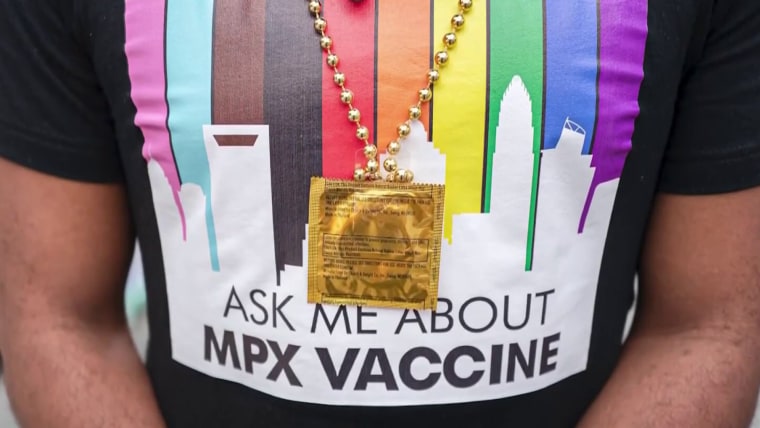CDC warns about the rise in almost untreatable Shigella bacterial infections
The Centers for Disease Control and Prevention is warning about a rise in extensively drug-resistant cases of the bacterial infection Shigella, a major cause of inflammatory diarrhea.
The agency calls the new form of the stomach bug, which causes the diarrheal condition known as shigellosis, a “serious public health threat.” Evidence suggests the illness is spreading among gay and bisexual men in particular, apparently through sexual contact, both in the U.S. and abroad.
The CDC held a call Tuesday with the Colorado Department of Public Health and Environment and the U.K. Health Security Agency to alert doctors about the spread of a form of the bacterium that is resistant to all typically recommended antibiotic treatments.
“We do not have all the answers today,” Dr. Louise Francois Watkins, a medical officer at the CDC’s National Center for Emerging and Zoonotic Infectious Diseases, said on the call. The agency, she said, could make no official recommendations for antibiotic alternatives.
A parallel outbreak in the U.K., first announced in January 2022, most likely stemmed from an initial single infection, British health officials said on the call Tuesday. That speaks to how widely individual drug-resistant strains can spread and to the importance of infection control.
The CDC said in a health alert Friday that the proportion of the approximately 450,000 annual U.S. Shigella infections that were resistant to all known antibiotic treatments rose from zero in 2015 to 0.4% in 2019 to 5% last year, an indicator of potential greater spread.
Shigella, which is highly infectious, spreads when infected fecal matter enters the mouth or the nose, including through sexual activity or because of poor hand-washing after diaper changes, unsanitary food handling or swimming in contaminated water. The infection is typically seen in young children.
The European Centre for Disease Prevention and Control issued an alert Friday about 221 confirmed and 37 possible cases among people who traveled to Cabo Verde off West Africa since September and returned home to about a dozen nations, including the U.S.
During the CDC call Tuesday, officers from the U.K. health agency reported they had analyzed all but four of 185 cases of the infection in Britain since late 2021. Half required antibiotic treatment. The Shigella samples retained susceptibility to four antibiotics: carbapenems, chloramphenicol, fosfomycin and temocillin.
Eighty-seven percent of the cases were in men presumed to have sex with men.
Dr. Stephanie Cohen, the section director for HIV and STI prevention at the San Francisco Public Health Department, told NBC News that Shigella is “a really important and serious pathogen.”
“It can cause really severe diarrhea, sometimes bloody diarrhea, cramps and abdominal pain,” she said.
Shigellosis usually goes away without treatment. But physicians may prescribe antibiotics to hasten recovery or otherwise avert complications in more vulnerable patients.
The infection can cause prolonged and debilitating illness, with about 6,400 U.S. patients needing hospitalization each year.
Death from shigellosis is rare, although it is more likely among people who are immunocompromised, such as by untreated HIV or chemotherapy for cancer.
Shigella is considered extensively drug resistant when it is not susceptible to any of the recommended first-line or alternative antibiotics, including azithromycin, ciprofloxacin, ceftriaxone, trimethoprim-sulfamethoxazole and ampicillin.
From May 2014 to February 2015, the CDC identified 243 U.S. cases of travel-associated Shigella that were resistant to most but not all of those antibiotics.
Now, doctors face a considerable challenge caring for patients with this form of Shigella. Reviewing an extensive roster of potential alternative antibiotics on the call Tuesday, Watkins noted that the medications are largely saddled with one or more limitations, such as unavailability in the U.S., lack of clinical trial data, resistance to the pathogen or the fact that they penetrate the gut lining poorly.
The CDC has called on health care providers to be vigilant for potential Shigella infections and to report suspected cases to state and local health departments, while educating people most at risk about shigellosis.
In addition to gay and bisexual men, antibiotic-resistant Shigella infections have been on the rise among people experiencing homelessness, international travelers and people living with HIV.
Of 232 cases reported from 2016 onward about which the CDC has data, 197, or 85%, were in men. Just one was in a child. Of the 41 of those people who answered questions about recent sexual activity, 88% were men reporting recent sexual contact with men.
Meanwhile, sexually transmitted gonorrhea, chlamydia and syphilis have been rising steadily in recent years and are particularly prevalent among gay and bisexual men. The CDC has issued increasingly urgent warnings that gonorrhea is at risk of losing susceptibility to the last remaining simple and effective antibiotic to treat the infection.

People who have shigellosis, the CDC advises, should stay home if they work in health care, food service or child care. The agency also advises that during the illness and for two weeks after, people should avoid preparing food for others, wash hands often, refrain from swimming and abstain from sexual contact, or at least observe rigorous hygiene before and after sexual activity.
The World Health Organization cites drug-resistant pathogens, the emergence of which are largely driven by the misuse and overuse of antibiotics in people and livestock, as one of the top 10 global public health threats facing humanity.

How officials contained the mpox virus through vaccinations
JAN. 31, 202304:38
“The clinical pipeline, the drugs that are in human testing, is fragile, and there’s not enough there,” said Kevin Outterson, the executive director of CARB-X, a Boston-based nonprofit group that seeks to spur innovation in early antibiotic research and development.
There are encouraging signs with antibiotic development, at least in early phases, Outterson said.
“If you want a drug that’s going to work against this disease or any other bacteria in 2033, we need to be working on that today,” he said.
The new Shigella raises concerns in the wake of the global mpox (formerly monkeypox) outbreak, which has overwhelmingly spread through sex between men. Cases of the virus, first identified in Britain in mid-May, peaked in the U.S. and internationally in early August and have largely subsided.
Similar to shigella cases, mpox infections, which can be severe, typically resolve without the need for treatment and are rarely fatal. However, a paper published Feb. 21 in The Lancet found an mpox death rate as high as 15% among people substantially immunocompromised by HIV.